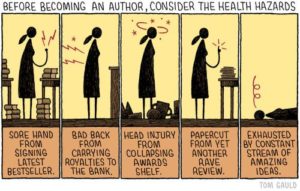Hello everyone! Momentum is a key element for success in completing any writing project, and this month has already be loaded with lots of good advice from folks who have been doing this a lot longer than I have. Some of their advice might contradict the advice I’ll be offering, but that’s part of the joy of writing. There’s no right or wrong way to do it – just the way that works for you.
I too have some advice to offer, something that works for me. This one simple trick, you might say, to avoid getting stuck in your path. (“Writer’s Blocks hate him!”) It may work for you, or it may not. In order to give my advice context though, I have to talk a bit about how I write. It’s a brief side road but I think the trip will be worth it.
Writers seem to be broken up into two general groups: the outliners and the pantsers. I have great admiration for pantsers, those brave souls who just sit down at the keyboard and make it happen live.
That’s amazing, but it will never be me. I am an outliner and I never sit down for my writing session with no idea what’s going to happen. I do several extensive outline passes of my plot and character arcs before I start page one. I often even have much of my dialog pre-written (or pre-recorded).
Once I start that first draft, I want nothing to stop me until I finish the novel. A story finished is a story fixable. I may be newer at this than some Fictorians, but I’ve had more than a few stories die from the blank screen of death because I stopped and just couldn’t get going again.
3,000 word days? Great. 1,000 words? No problem. 25 words? At least I moved forward. The only number I don’t want is zero. As long as I’m moving in any way, I tend to keep moving. It’s when I straight up stop that the problems begin
Yet even with the best outline you can run into issues. Maybe you realize a plot hole you didn’t count on, or dialogue that sounded great in your head just reads corny now that you see it on the page. Very common for me, you knew there was a fight scene here but you didn’t block it out and now it makes no sense.
Any of these can get me stuck, lead me to a zero day where the cursor blinks at me and I simply blink back. This is the one thing I don’t want. So, what do I do when I’m stuck?
I cheat.
I simply skip where I’m stuck by using my two best friends: left angle bracket and right angle bracket.
If you look at my completed first drafts, they will be riddled with these. A few examples from my first draft of SEAS OF EVEREST, Book 2 of the trilogy I am working on:
<finish this up>
<a little more here>
<describe the city>
<she gets upset>
<insert amazing mammoth fight scene here>
Yep, I used them to summarize an entire action scene. I was very stuck on the blocking of that scene (there was a wooly mammoth in it after all) and couldn’t just sit there and work all that out. I took a shot at it but realized my writer brain was not in ‘write action scene’ mode that day. I could stop and try to force it, or I could throw some angle brackets down and move on.
Move on. You know, keep my momentum. No zero days.
That’s exactly what I use them for. So I can maintain my momentum. Gots ta keep on keepin’ on or that book is never going to be finished. I knew that fight scene would come to me later, and it did.
When I finished SEAS OF EVEREST I went back and found I had 83 angle bracketed items to go back and fill. Some were quick and easy, others were decent projects. Closing those 83 items took me all of three days and I freely admit those days were pretty long.
But the book was done. The story was complete, I had got to the end of the tale. That is always the goal for me, get to the damn end. Once you’ve been there, you can always go back and clean up those items you left undone along the way.
If you stop and hammer out each one? Well, you might never get where you’re going.

 One of my many medical issues involves a common writer’s ailment – carpal tunnel. When I first started getting it I did what most folks do: I ignored it. Then it evolved from a single soldier to a tank battalion running over my wrists every time I typed more than a page.
One of my many medical issues involves a common writer’s ailment – carpal tunnel. When I first started getting it I did what most folks do: I ignored it. Then it evolved from a single soldier to a tank battalion running over my wrists every time I typed more than a page.


